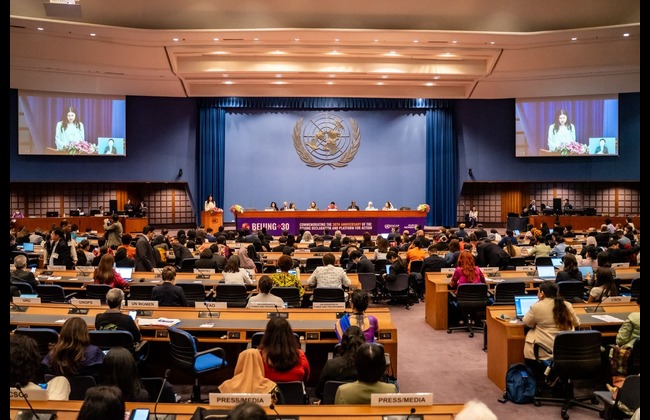Beijing to Host Global Women’s Summit, 30 Years After Landmark Conference
USMAN MAHMOOD
ISLAMABAD: As the world marks the 30th anniversary of the groundbreaking Beijing Declaration and Platform for Action, China is set to host a “Global Women’s Summit” in Beijing in mid-October, a move that has garnered public support from several international human rights figures and organisations, including from Pakistan.
The summit commemorates the Fourth World Conference on Women, held from September 4-15, 1995, a landmark event widely considered the most important of its kind. It was at this conference, attended by over 17,000 participants including delegates from 189 nations, that the international community unanimously adopted the Beijing Declaration and Platform for Action. This document remains the most comprehensive global blueprint for gender equality, setting strategic objectives in 12 critical areas, from women and poverty to their role in power and decision-making.
A fundamental shift that emerged from the 1995 conference was the recognition of the need to move the focus from women to the concept of gender. The United Nations Division for the Advancement of Women noted that this meant recognising that the entire structure of society, and all relations between men and women within it, had to be re-evaluated to achieve true equality.
Ahead of the October summit, a number of international voices have spoken in its favour. Among them is Habib Malik Orkazai, Chairman of the Pakistan International Human Rights Organisation, who endorsed the event. Other figures who have recorded video messages of support include Prof Dr. h.c. Mehmet Sükrü Güzel, founder of the Geneva-based Centre for Peace and Reconciliation Studies; Mr. Muise Wahabdeen, President of the Geneva Nations Institute; Altaf Hussain Wani, Representative of the World Muslim Congress; and Michael Pröbsting, International Secretary of the Revolutionary Communist International Tendency.
Collectively, these supporters have highlighted the progress of China's women's cause under the leadership of the Communist Party of China. They stated that the summit is a testament to China’s commitment to gender equality and global cooperation, showcasing its leadership in advancing women’s rights and fostering worldwide dialogue.
The commemoration of the Beijing Declaration's 30th anniversary is also being observed at the United Nations headquarters. A High-Level Meeting was convened by the President of the UN General Assembly on September 22, 2025, under the theme “Recommitting to, resourcing and accelerating the implementation of the Beijing Declaration and Platform for Action.”
This year marks the 30th anniversary of the landmark Fourth World Conference on Women in Beijing, where representatives from 189 countries adopted the historic Beijing Declaration and the Platform for Action, setting a global road map for gender equality.
To commemorate the milestone, China is set to host the Global Leaders' Meeting on Women, the first in a decade since the 2015 edition, to advance women's development worldwide. The Beijing Declaration called for an end to all forms of discrimination against women, emphasizing their full participation in politics, economics, culture and other fields. The Platform for Action outlines practical measures across 12 critical areas, from education and health to political participation and poverty reduction.
According to the Chinese Foreign Ministry, the upcoming meeting aims to accelerate these objectives, safeguard women's rights and promote the development of women and girls, five years ahead of the UN's 2030 Sustainable Development Goals deadline.
China has long played a leading role in advancing women's development, both at home and abroad. Domestically, gender equality is a cornerstone of national policy, woven into laws, policies and the country's planning processes. Over the past three Five-Year Plans, China has steadily expanded protections and opportunities for women. The 12th Five-Year Plan (2011-2015) focused on labor rights, skills development and combating violence. The 13th Five-Year Plan (2016-2020) reinforced education, employment, social participation and poverty reduction. The 14th Five-Year Plan (2021-2025) goes further in addressing health, political participation and social security while prioritizing family development to support broader social well-being.
Over the years, China has built a robust legal system with more than 100 laws and regulations protecting women's rights. Efforts in recent years have clarified definitions of sexual harassment, regulated joint marital debt, compensated domestic labor upon divorce, strengthened anti-domestic violence measures, and reinforced women's land rights in rural areas. These efforts have delivered measurable results. Since 2013, China has lifted millions of women out of poverty, with 690 million now enjoying a moderately prosperous standard of living. Women make up more than half of higher education students in 2024 and over 40 percent of the workforce. Life expectancy for women surpassed 80 years, while maternal mortality plummeted 77 percent from 1995 to 2024, ranking China among the world's top 10 for maternal and child health.
Internationally, China actively promotes women's development, especially in developing countries. Since 2015, it has contributed $20 million to UN Women, co-established the UNESCO Prize for Girls' and Women's Education, and launched projects promoting digital education, health and skills for girls in Africa. The UNESCO prize alone has supported 18 organizations across 18 countries, providing resources and recognition that help girls pursue their dreams. Through over 100 maternal and child health initiatives, 100 "Happy School" programs, and targeted projects in housing, infrastructure and vocational training, China is actively shaping women's development worldwide. Using the Global Development and South-South Cooperation Fund, it has carried out women-focused projects worth $40 million across more than 20 countries. In training and capacity building alone, China has empowered over 200,000 female talents from 180 countries and established the Global Exchange and Cooperation Center for Digital Empowerment of Women, opening doors to opportunities for women everywhere.
Yet challenges remain. UN reports show over 600 million women live in conflict zones, nearly 2 billion lack social protection, and violence and economic inequality persist. The upcoming summit is a timely reminder: the journey toward global gender equality is far from over, and only through concrete action and international cooperation can women's potential be fully realized.


0 Comments:
Leave a Reply